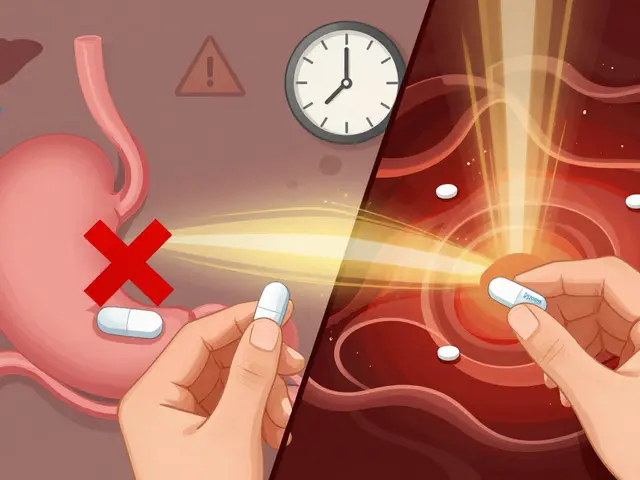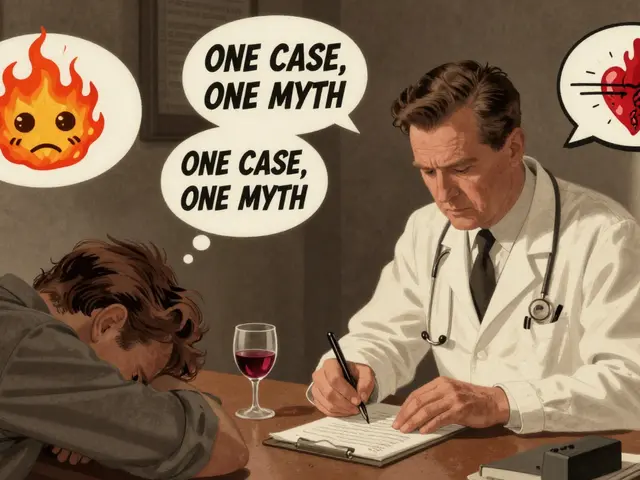Side effects: How to spot them and what to do right away
Getting a new prescription can feel like a relief — until the nausea, rash, or dizzy spells start. Side effects are common, but not all are dangerous. This page helps you tell the small stuff from the urgent problems, plus quick steps you can try at home and when you must call your clinician.
Common side effects and simple fixes
Some reactions are predictable and easy to manage. Stomach upset and nausea often come from antibiotics like rifampin or other strong meds. Try taking food, sipping plain crackers or ginger tea, and staying hydrated. If food makes the medicine less effective, check with your pharmacist first. Dizziness or lightheadedness can follow blood pressure drugs; get up slowly, avoid driving until you know how the drug affects you, and mention it to your doctor.
Skin reactions range from mild itch to serious rashes. A new red, itchy patch after starting losartan or another drug might be a mild allergic response — over-the-counter antihistamines can help short-term. But if you see spreading blisters, face or throat swelling, or breathing trouble, stop the drug and get emergency care right away.
Some meds cause sexual side effects or mood changes. Antidepressants and certain pain meds can affect libido or cause sleep shifts. Don’t stop them abruptly; talk to your prescriber about dose changes or alternatives. There are often safer switches that keep benefits while reducing side effects.
Steps to take when a side effect shows up
1) Stop or pause only if the reaction is severe. For mild issues, try simple fixes (food for tummy upset, extra fluids for dry mouth) and monitor. 2) Keep a short log: when you took the drug, what started, how long it lasted. That record makes your doctor’s job easier. 3) Check interactions — many problems come from mixing medicines, supplements, or even grapefruit with prescriptions. Your pharmacist can run an interaction check fast. 4) Ask about alternatives. If a drug like Exelon causes nausea or dizziness, a dose change or different medication may work better for you.
If you suspect an allergic reaction or anything that affects breathing, swallow, or consciousness — call emergency services. For less urgent but worrying reactions, contact your prescriber same day or use telehealth if available. You can also report serious adverse events to your local health authority or FDA MedWatch to help track drug safety.
This tag groups articles that dig into specific side effects — from "Can Losartan Cause Rashes?" and "Rifampin and Stomach Issues" to pieces on topical steroid reactions like Elocon or neurological meds such as Exelon. Browse those posts for drug-specific signs, real-world tips, and how people managed the same problems.
Final tip: weigh the benefits against the risks. Most meds have side effects, but many are manageable. Keep a clear list of your drugs, note any new symptoms, and speak up early — that's the fastest path to a safer, comfortable treatment plan.

Cetirizine vs Levocetirizine: Which Causes Less Drowsiness and Why
Cetirizine and levocetirizine are both effective allergy meds, but levocetirizine causes less drowsiness. Learn how they compare in side effects, dosing, cost, and real-world results.
View More
Antidepressants: Types and Safety Profiles for Patients
Antidepressants help millions manage depression and anxiety, but they come with side effects and risks. Learn the main types, how long they take to work, common side effects like weight gain and sexual dysfunction, and what to do if they don't work.
View More
Mircette Explained: Uses, Dosage, Side Effects & FAQs
Learn what Mircette is, how to take it safely, its common side effects, and answers to the most asked questions about this medication.
View More
Accutane: Real Experiences, Side Effects, and Acne Treatment Success
Struggling with stubborn acne? This article digs into Accutane, exploring how it works, who might need it, and what to expect if you go on it. Experience real, relatable advice and facts you won't find on the pills' insert. You'll also get practical tips for managing side effects and making the most of your treatment, so you can move toward clearer skin with confidence.
View More
Amiloride: A Closer Look at Its Side Effects and Contraindications
In my latest blog post, I took a closer look at Amiloride, a commonly prescribed diuretic medication. While researching, I discovered that some of its side effects include dizziness, headache, and stomach pain. More severe side effects could be hyperkalemia, irregular heartbeat, and kidney dysfunction. It's crucial to be aware of potential contraindications, such as patients with hyperkalemia, renal impairment, or those taking potassium supplements. As always, it's essential to consult with a healthcare professional before starting or stopping any medication, including Amiloride.
View More
Betaxolol: A Guide to Understanding the Side Effects
As a copywriter, I've researched Betaxolol and learned about its side effects. Betaxolol is a medication used primarily to treat high blood pressure and glaucoma. Some common side effects include dizziness, fatigue, and shortness of breath. It's essential to discuss any concerns with your healthcare provider, as they can help you weigh the benefits and potential risks. Remember, always follow the prescribed dosage to minimize unwanted side effects.
View More




